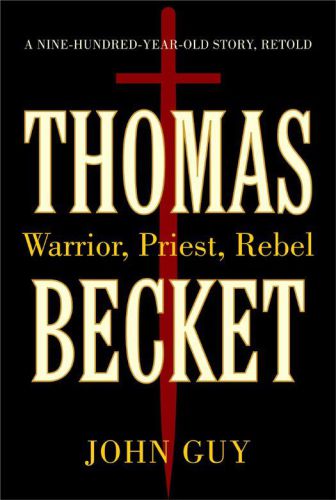
Thomas Becket
Warrior, Priest, Rebel
کتاب های مرتبط
- اطلاعات
- نقد و بررسی
- دیدگاه کاربران
نقد و بررسی

Starred review from May 7, 2012
Guy (Queen of Scots) gives us another masterful biography, this time of Thomas Becket (1118–1170), the man who refused to subordinate the power of the church to the power of the state, and was martyred for it. Through his engrossing chronicle of Becket’s life and work, Guy, a history fellow at Cambridge, regales us with the tale of a man who, because of his own rhetorical and administrative skills became Henry II’s right-hand man and eventually his mortal enemy. Distilling and disputing materials from several previous Becket biographies, Guy traces his subject’s development from a handsome, superficial, and socially ambitious youth to a mature man who rose intellectually, morally, and politically to become lord chancellor to Henry II. In 1162, he was named archbishop of Canterbury, a position he accepted reluctantly, knowing that his honest exercise of the office as a defender of liberty and as one who would assert the church’s power to cancel unjust state laws would bring him into conflict with Henry. Guy’s masterfully told tale of a man attempting to live up to his ideals amid political and religious intrigue brings Becket fully to life. 2 photo inserts, 2 maps. Agent: Grainne Fox, Fletcher & Co.

May 1, 2012
In this lively new biography of Thomas Becket, Guy (A Daughter's Love: Thomas More and His Dearest Meg, 2009, etc.) illustrates his vast knowledge of medieval England. The author explains Becket's non-royal, but hardly peasant, heritage and describes a stammering youth in which he had little interest in study. His Norman parents saw to it that he was well educated, however, including sending him to France for his studies. There he met his lifelong friend, John of Salisbury, who would provide a firsthand account of Becket's murder in Canterbury Cathedral. France was also a flight to safety from tensions at home. Becket was well-known as rakish, lazy and vain, and he never really applied himself to his studies. When Theobald, Archbishop of Canterbury, took him into his household, he realized his failings and set to ameliorate his poor education with an autodidactic fervor. Becket watched and learned as Theobald politicized the relationship between the king and archbishop, not realizing that he, too, would one day face exile as he refused to be "bullied by a tyrant." In his nine years of service to the archbishop, Becket gained considerable power and riches, but many still regarded him as a newcomer aspiring to be an insider. However, he felt he was an equal, especially after he was appointed as the king's chancellor. The author's exhaustive research shows that Becket clung to the trappings of wealth he had accumulated well after being appointed as archbishop. Guy exposes Becket's history so well that readers may question how much of a saint he really was.
COPYRIGHT(2012) Kirkus Reviews, ALL RIGHTS RESERVED.

February 1, 2012
Chancellor to Henry II, then his nemesis as Archbishop of Canterbury, Thomas Becket was exiled for six years and assassinated by four of Henry's knights upon his return home. Perhaps a well-known story, but Guy has the credentials to tell it well, having lectured in early modern British history and presented five documentaries for BBC2 television. Pitched as appropriate for undergraduate use, so definitely for your high-end readers.
Copyright 2012 Library Journal, LLC Used with permission.

Starred review from June 1, 2012
Guy leaps back 400 years from the Tudor period, the wellspring of many books by him, including the well-received biographies Queen of Scots (2004) and A Daughter's Love (2009), to chronicle the first mighty church-state struggle in England. Becket (ca. 111870), a bright son of the nascent middle class, handsome and suave, rose to become an often theatrically effective chancellor for the exceptionally willful King Henry II. Eventually, Henry proposed that Becket be archbishop of Canterbury, too. The king wanted to arrogate certain church prerogatives, chiefly, the punishment, if not the trial, of criminal priests and the appointment of bishops. But Becket, possessed of a deep though secreted piety, proved a stickler for the church's rights, marking his altered allegiance by resigning as chancellor. In little more than a year, he was fleeing into exile, where family and supporters, expropriated and expelled soon after, joined him. Six years of wrangling seemed to reach a settlement, Becket came home, and less than half a year later, he was murdered in the cathedral. Henry finally had to back off and showily join the cult of the soon-canonized Becket. Constantly referencing and weighing the credibility of his sources, Guy retells this epical real-life drama with lucid straightforwardness and great dramatic impetus. While keeping Becket in focus throughout, he also makes the rapacious force of nature that was Henry II leap from the page with thrilling, chilling vividness.(Reprinted with permission of Booklist, copyright 2012, American Library Association.)

























دیدگاه کاربران